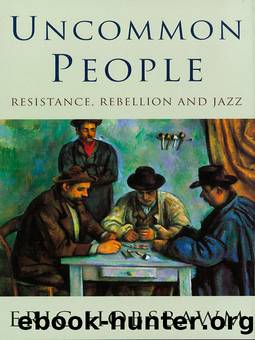Uncommon People by Eric Hobsbawm

Author:Eric Hobsbawm
Language: eng
Format: epub
ISBN: 9781780220536
Publisher: Phoenix
IV
Nevertheless, peasant action and political change interacted in complex ways. Who organized and led land invasions? Since they were affairs of the community as a whole we must assume that in the classical form they were led by its leaders and officials, whose leadership so often (as in the Russian obshchina) required the ability to identify and express the consensus of ‘the people’, though conversely the readiness of the people to listen to men of wisdom and judgment, perhaps coming from families with a record of leadership in the community, was a powerful element in formulating such a consensus. We must remember that communal democracy proceeds by ‘the sense of the meeting’ rather than by majority vote. But, in the period in which our documentation is best, community decision was a more complex affair than in the example described in the prologue of John Womack’s brilliant book on Zapata.
In the first place, the ‘Community’ itself cannot always be regarded as ancient and traditional. As often as not it was new in two senses: because it had broken away from an older community for demographic or other reasons, and because it utilized a specific juridical device which might itself be novel, and which happened to be advantageous, for example from the 1920s the procedure of ‘recognition’.61 No doubt the ways in which bodies of new settlers organized and took collective decisions were the traditional ways of peasants with the age-old experience of communal action, but the element of novelty is not to be overlooked.
In the second place, each Peruvian community was itself being transformed by a process of internal class differentiation, and increasingly also by what may be called external differentiation, namely the formation of a (relatively more prosperous) emigrant group in the city or cities, a group from which the men whose opinions carry weight – not least because of their presumed political know-how – are today often chosen. Paradoxically, the emigration of the kind of local notable whose family used to monopolize village offices may well leave the road to village political leadership open to others, even to newcomers.62 The uneven progress of education also introduced a new element into village politics. In brief, modernization brought with it broader contacts with the outside world, initially for some, increasingly for many.
A good example of this is the case of Yanacancha, already mentioned in the course of this discussion.63 Here, in the early 1920s, when the community was engaged in its double conflict with the parent community of Ahuac and the Hacienda Laive, one of the wealthiest comuneros convinced one Yauri to take the leadership of the campaign, since he, though from a poor family, had some (incomplete) secondary education and was a schoolmaster in a nearby village, as well as possessing a brother already in Lima. Yauri (who was joined by a former schoolfellow, one Camayo) did indeed become very active in the campaign. This brought him into much closer contact with Lima, to which he had to travel frequently
Download
This site does not store any files on its server. We only index and link to content provided by other sites. Please contact the content providers to delete copyright contents if any and email us, we'll remove relevant links or contents immediately.
| Anthropology | Archaeology |
| Philosophy | Politics & Government |
| Social Sciences | Sociology |
| Women's Studies |
Cecilia; Or, Memoirs of an Heiress — Volume 1 by Fanny Burney(32558)
The Great Music City by Andrea Baker(32018)
Cecilia; Or, Memoirs of an Heiress — Volume 2 by Fanny Burney(31956)
Cecilia; Or, Memoirs of an Heiress — Volume 3 by Fanny Burney(31941)
We're Going to Need More Wine by Gabrielle Union(19046)
All the Missing Girls by Megan Miranda(16023)
Pimp by Iceberg Slim(14506)
For the Love of Europe by Rick Steves(14121)
Bombshells: Glamour Girls of a Lifetime by Sullivan Steve(14073)
Talking to Strangers by Malcolm Gladwell(13370)
Norse Mythology by Gaiman Neil(13363)
Fifty Shades Freed by E L James(13239)
Mindhunter: Inside the FBI's Elite Serial Crime Unit by John E. Douglas & Mark Olshaker(9339)
Crazy Rich Asians by Kevin Kwan(9290)
The Lost Art of Listening by Michael P. Nichols(7506)
Enlightenment Now: The Case for Reason, Science, Humanism, and Progress by Steven Pinker(7311)
The Four Agreements by Don Miguel Ruiz(6763)
Bad Blood by John Carreyrou(6621)
Weapons of Math Destruction by Cathy O'Neil(6279)
